Frédérique Aït-Touati
About
Frédérique Aït-Touati vit et travaille à Paris. Metteure en scène et chercheuse au CNRS, elle explore les liens entre sciences, arts et politique et fait du théâtre un lieu d’expérimentation. Après des études de lettres à l’ENS de Lyon, elle se forme à la mise en scène à Cambridge en Angleterre où elle crée sa compagnie en 2004, tout en poursuivant une thèse en histoire des sciences. Elle enseigne à l’Université d’Oxford de 2007 à 2014 avant de revenir en France pour se consacrer à la recherche et au théâtre. Elle est en résidence à la Chartreuse de Villeneuve-lès-Avignon et à la Comédie de Reims de 2011 à 2013 pour le projet Gaïa Global Circus du Centre Pompidou (Beaubourg). A partir de 2014, elle est invitée au théâtre Nanterre-Amandiers avec SPEAP, l’académie expérimentale qu’elle dirige. C’est aux Amandiers qu’elle crée la plupart de ses spectacles depuis : en 2015, elle conçoit avec Bruno Latour et Philippe Quesne Le Théâtre des négociations-Make it work, performance d’une semaine avec 200 étudiants proposant une négociation alternative sur le climat. Elle met en scène l’année suivante la conférence-performance INSIDE (en tournée à Berlin, Francfort, New York, au Kaaitheater de Bruxelles et à la Criée à Marseille) puis Moving Earths avec Bruno Latour, repris comme pièce pour un acteur au théâtre de l’Odéon en 2020. En août 2020, Tino Sehgal l’invite dans l’exposition Down to Earth, dans le cadre du Berliner Festspiele. Elle poursuit par ailleurs une activité d’enseignement à l’École des Hautes Études en Sciences Sociales et à SPEAP, ainsi qu’à l’étranger où elle enseigne régulièrement à NYU et à Oxford. Elle a notamment publié Contes de la Lune, essai sur la fiction et la sciences modernes (Gallimard, 2011) et Terra Forma, manuel de cartographie potentielle (B42, 2019).
(English)
Frédérique Aït-Touati is a historian of science and literature, a theatre director, and a CNRS Research Fellow at the Ecole des Hautes Etudes en Sciences Sociales in Paris. Her work explores connections between the sciences and the arts. She was a student of the Ecole Normale Supérieure and received the Agrégation de Lettres Modernes in 2001. She studied the history of science at Cambridge University, where she was a member of Trinity College (Knox Scholar). With the support of a Rouse Ball Scholarship, she completed a Ph.D. in Comparative Literature and History of Science (2008, Sorbonne University). Aït-Touati was awarded the 2012 MLA Prize in Comparative Literature for her book Fictions of the Cosmos (Chicago University Press, 2011) and the Prix Gegner de l’Académie des Sciences Morales et Politiques for Contes de la Lune, essai sur la fiction et la science modernes (Gallimard, 2011). Her other books include Histoires et savoirs (2012), Le Monde en images (2015), Terra Forma, manuel de cartographies potentielles (B42, 2019 / MIT Press, 2021), Le Cri de Gaïa (2021), Trilogie Terrestre (2022).
Before joining the CNRS in 2014 she taught at the Sorbonne University (2003-2007) and was a Fellow in French at the University of Oxford (2007-2014). Her interests include early modern literature, astronomy, optics, the history of natural history and the sciences of the Earth from the seventeenth through the twenty first centuries, including cartography, cosmography, and ecology/environmentalism. She also works on early modern and contemporary theatre and performance, the history of set design and baroque machineries. Aït-Touati has written essays and reviews for a variety of publications, including Le Monde, Libération, AOC. She is the director of the Experimental Programme in Political Arts (SPEAP) founded by Bruno Latour.
With Latour and her theatre company Zone Critique she has created plays and performances, including Gaia Global Circus (2013-2016), Make it Work/The Theatre of Negotiations (2015), INSIDE (2016-2018), Moving Earths (2019-2020) and VIRAL(2021) works which have been presented around the world, and recently in Paris, New York, the Taipei Biennale and the Berliner Festspiele.
In 2017, she was the scientific curator of the exhibition Animating landscape at the Museum of Nature and part of the curating committee for the exhibition Where to land? At the Gropius Bau Berlin with Tino Sehgal and Thomas Oberender. Her work as a director (Zone Critique company) has been presented at the Nanterre-Amandiers theater, the Théâtre de l’Odéon in Paris, the Comédie de Reims, the Dijon-Bourgogne theater, the Passage theater in Switzerland, the ZKM in Karlsruhe, the HAU and Berliner Festspiele in Berlin, the Mousonturm in Frankfurt, Culturegest in Lisbon, The Kitchen, The Signature Theatre and the festival Crossing the Line in New York, the Kaaitheatre in Brussels, the Théâtre National de la Criée in Marseille, the Pompidou Center, in London or in Canada.
Contact
F.AITTOUATI@GMAIL.COM
La compagnie Zone Critique
La « zone critique » est la mince pellicule superficielle de la Terre où l’eau, le sol, le sous-sol et le monde du vivant interagissent. Cette zone a été nommée « critique » par les géochimistes, parce que s’y concentrent la vie, les activités humaines, et leurs ressources.
Zone Critique rassemble, comme sur un bureau, les différents travaux collectifs et personnels de Frédérique Aït-Touati : spectacles et performances de la compagnie, publications, enseignement (SPEAP, EHESS, NYU), expositions, émissions de radio et travaux en cours.
LA COMPAGNIE
Créée en 2004 en Angleterre par Frédérique Aït-Touati, la compagnie Zone Critique explore différents modes d’écriture théâtrale et interroge les imaginaires scientifiques et écologiques.
Depuis, la compagnie a été accueillie en résidence à la Chartreuse de Villeneuve-lez-Avignon et à la Comédie de Reims de 2010 à 2013, puis au théâtre Nanterre-Amandiers de 2014 à 2021. À partir de la saison prochaine, Zone Critique sera en résidence au Théâtre National de Chaillot et intégrée au projet artistique de Rachid Ouramdane.
Après plusieurs années d’exploration du répertoire francophone et anglophone (Phèdre de Racine, A Streetcar Named Desire de Tennessee Williams, Landscape de Harold Pinter, Elle est là de Nathalie Sarraute, En attendant Godot de Samuel Beckett), la compagnie s’est associée au philosophe Bruno Latour pour des projets au croisement de la recherche et du théâtre. Frédérique Aït-Touati et Bruno Latour développent ensemble au sein de la compagnie Zone Critique différentes formes d’écriture théâtrale et performative. Entre histoire des sciences, théâtre et philosophie, leurs projets en collaboration interrogent les conséquences esthétiques et politiques du changement de cosmos que nous proposent les sciences du Système Terre : conférences-performances (« Tarde/Durkheim », Cerisy et Cambridge, 2007 ; « Bergson/Einstein », Centre Pompidou, 2010 ; « Anthropocène Conférence », Musée des Confluences et Quai Branly, 2015), le spectacle Gaïa Global Circus (2013-2016, en tournée en France, Angleterre, Suisse, Allemagne, États-Unis, Canada), la simulation Le Théâtre des Négociations / Make it Work (théâtre Nanterre-Amandiers, avec Philippe Quesne, 2015), INSIDE (création au théâtre Nanterre-Amandiers 2016, en tournée de 2017 à 2019 à Berlin, Frankfort, New York, au TJP-CDN de Strasbourg, au Kaaitheatre de Bruxelles et au Théâtre national de La Criée, Marseille, Gropius Bau - Berlin, Allemagne), Moving Earths (Uppsala - Suède, Théâtre Nanterre-Amandiers, Théâtre de l’Odéon, Collège des Bernardins, Yverdon les Bains - Suisse, Gropius Bau - Berlin, Allemagne).
En 2022, la compagnie présente pour la première fois l’intégralité de la Trilogie Terrestre au Festival de l’anthropocène au Tangram puis au Festival Crossing the Lines du FIAF à New York en octobre prochain.
Pendant la saison 22-23, Zone Critique va créer le spectacle Earthscape avec le philosophe Emanuele Coccia, et préparer notre prochaine création pour 23-24 : La leçon d’anatomie d’Elisabeth Gardamer avec l’écrivain Camille de Toledo et le géochimiste Jérôme Gaillardet.
SPEAP : 10 ans !
Happy Birthday SPEAP !
Samedi 24 septembre, a eu également eu lieu le lancement du livre « Puissances de l’enquête – L’École des Arts politiques », qui retrace l’histoire de l’École des Arts politiques créée en 2010. Edité par Les Liens qui Libèrent, le livre présente le Manifeste compositionniste de Bruno Latour, différents essais des membres du corps pédagogique de SPEAP (Frédérique Aït-Touati, Valérie Pihet, Jean-Michel Frodon, Emanuele Coccia et Donato Ricci) et les récits d’anciens élèves de SPEAP sur leur travail d’enquête pour les commandes . Sa lecture est une invitation à en découvrir un peu plus sur la pédagogie, les méthodes et les pratiques d’enquête proposées par le SPEAP.
Le lancement a eu lieu au Théâtre de Chaillot, en présence de Mathias Vicherat (Directeur de Sciences Po), Pierre Lungheretti et Fanny Cohen (directeur délégué et secrétaire générale de Chaillot), du corps pédagogique de SPEAP, d’anciens élèves, d’étudiants actuels, de professeurs de Sciences Po, de journalistes et de curieux.
VIRAL
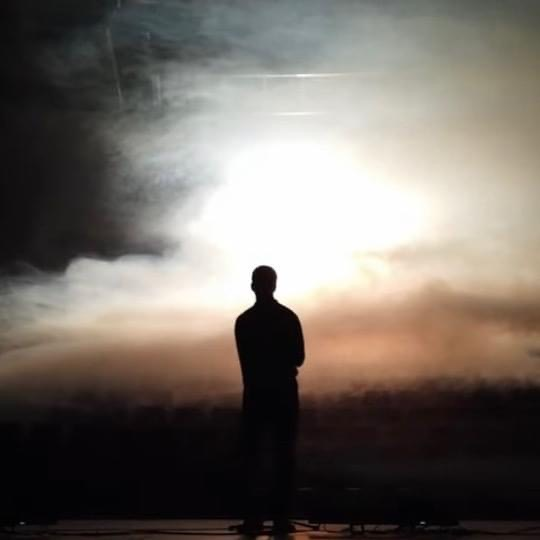
Concept by Frédérique Aït-Touati and Bruno Latour
Directed by: Frédérique Aït-Touati
Scenography, video and light design: Patrick Laffont de Lojo
Music: Grian Chatten
Dramaturgy: Camille Louis
Scientific collaboration: Emanuele Coccia, Nikolaj Schultz
Assistant: Esther Denis
With Duncan Evennou
Production: Critical Zone
Co-production: Théâtre Nanterre-Amandiers
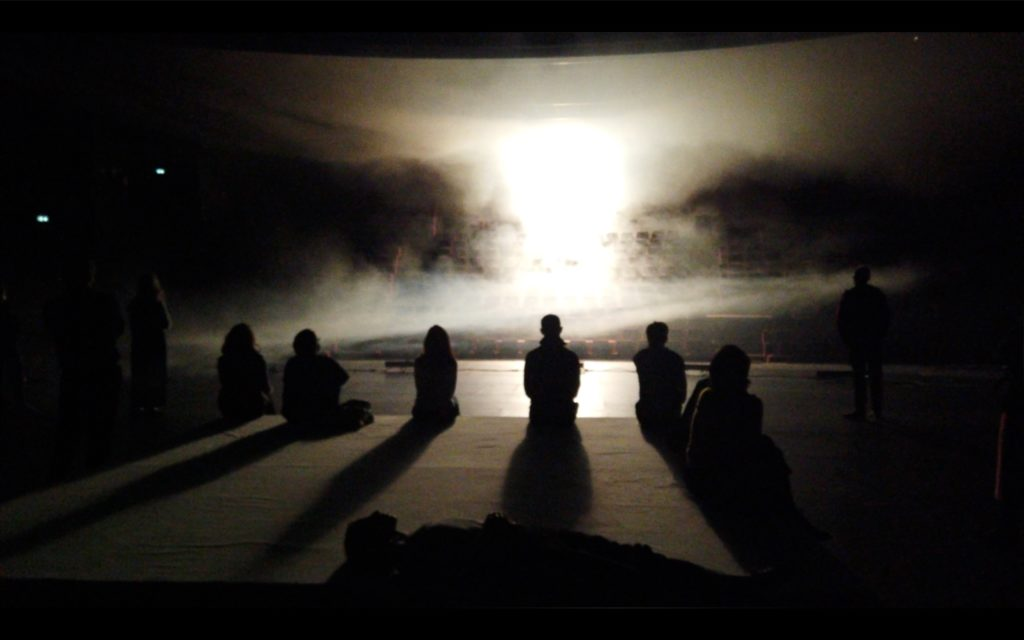
TRILOGIE TERRESTRE
Festival Crossing the Lines du FIAF à New York
de Frédérique Aït-Touati et Bruno Latour
Le 27 octobre à 19h30
Le 28 octobre à 19h00
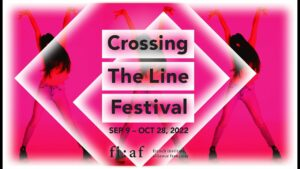
Face à la crise écologique, nous avons la plus grande peine à nous représenter collectivement où nous sommes, qui nous sommes, quels sont les protagonistes en conflit, et, surtout, quel rôle nous devons jouer dans cette aventure à laquelle nous n’étions pas préparés. Comme toujours en période de crise profonde, le théâtre semble particulièrement apte à capter le bouleversement en cours. Ce que nous ne sommes pas capables de penser ensemble, il faut le mettre en scène devant un public.
La Trilogie Terrestre est le résultat d’un processus d’écriture singulier que nous menons depuis une douzaine d’années. Elle emprunte aussi bien à l’expérience scénique, à l’histoire des sciences, à la politique, aux sciences de la Terre et à l’anthropologie, pour tester la capacité de ces disciplines à absorber le choc du nouveau régime climatique.
Les trois conférences-performances peuvent être lues comme des étapes successives dans la découverte d’une nouvelle condition terrestre. Inside offre une plongée surprenante dans la surface inconnue de la Terre, la zone critique. Moving Earths dresse le parallèle entre l’ancienne Terre et la nouvelle Terre qui se meut, en introduisant la figure de Gaïa. Enfin, Viral tire la leçon des virus pour explorer le terrestre comme intrication de vivants.
Par cette trilogie, nous testons l’hypothèse que le bouleversement cosmologique majeur que nous vivons actuellement ne peut se passer d’un nouveau personnage, Terre, ou Gaïa, introduit sur la scène du monde.
Frédérique Aït-Touati et Bruno Latour

CLIMAT. LE THÉÂTRE DES NÉGOCIATIONS (UN FILM DE DAVID BORNSTEIN)

ARTS DE DIRE, ARTS DE VOIR DANS UN MONDE ABÎMÉ

TERRA FORMA / CHANTIER #5 : HABITER PARMI LES VIVANTS / ATELIER DE CARTOGRAPHIE

LE THÉÂTRE DES MONSTRES

RÉCITS DE LA TERRE

LE THÉÂTRE DES NÉGOCIATIONS

LA RÉVOLUTION SELON POMMERAT

L’IMAGE MANQUANTE DU GLOBE – SUR LE THÉÂTRE DU MONDE DE FRANCES YATES
CLIMATS DU THÉÂTRE AU TEMPS DES CATASTROPHES

CHRONIQUES LIBÉ / FIN DE LA CIVILISATION (MISOGYNE)

MOVING EARTHS

TERRA FORMA

LE CRI DE GAÏA

ANIMER LE PAYSAGE

CONNAISSANCE SENSIBLE

CHAOSMOS – SUR LES STATIONS DE NOÉMIE GOUDAL

INSIDE

UNIVERS PRÉPARÉ – SUR AQUAALTA DE CÉLESTE BOURSIER-MOUGENOT

LE THÉÂTRE DES NÉGOCIATIONS – MAKE IT WORK

L’ARAIGNÉE, L’ARTISTE ET LE PHILOSOPHE – SUR TOMÁS SARACENO

SPEAP

GAIA GLOBAL CIRCUS

CONTES DE LA LUNE
Terra Forma
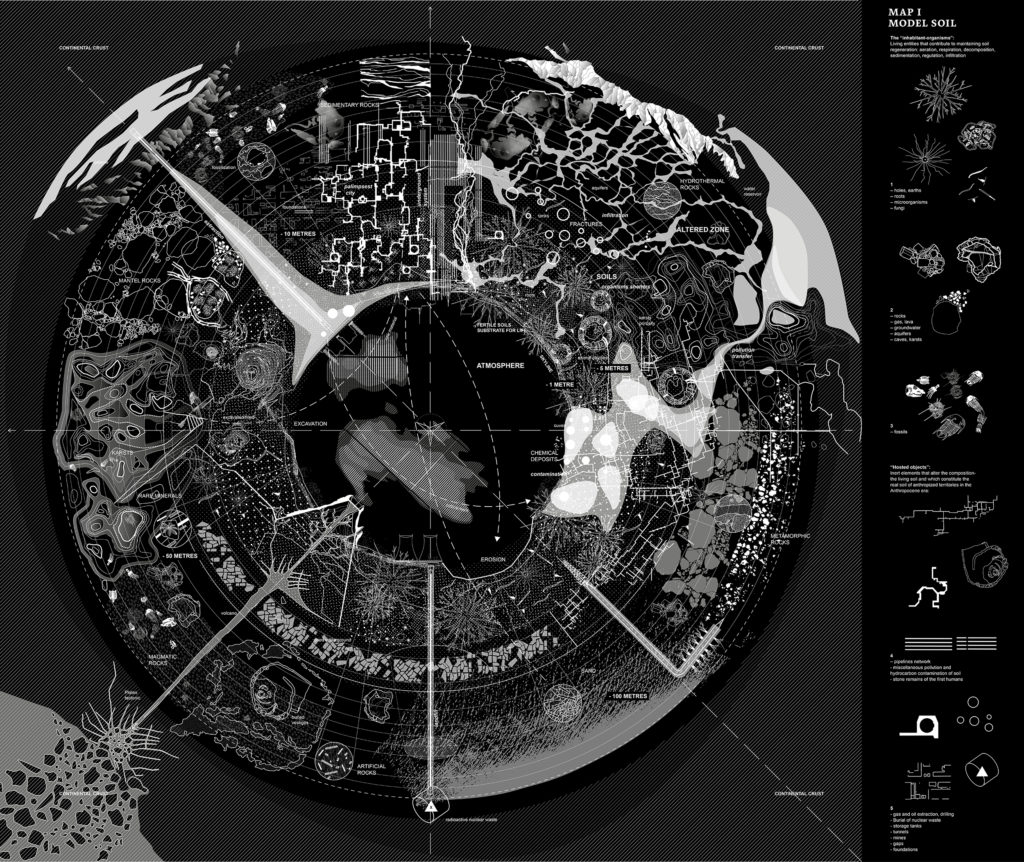
Terra Forma raconte l’exploration d’une terre inconnue: la nôtre. Cinq siècles après les voyageurs de la Renaissance partis cartographier les terra incognita du Nouveau Monde, cet ouvrage propose de redécouvrir autrement cette Terre que nous croyons si bien connaître. En redéfinissant, ou plutôt en étendant le vocabulaire cartographique traditionnel, il offre un manifeste pour la fondation d’un nouvel imaginaire géographique et, ce faisant, politique.
Les sept chapitres de ce livre sont des points de vue sur la réalité, de possibles visions du monde esquissées par différents prismes, comme autant d’instruments optiques : par les profondeurs, par les mouvements, par le point de vie, par les périphéries, par le pouls, par les creux, par les disparitions et les ruines, ils produisent des savoirs situés, incarnés. Écrit sur le mode du récit d’exploration, cet ouvrage se veut aussi un manuel de dessin, qui invite le lecteur à explorer les techniques de représentation sur divers terrains, dans le but de constituer progressivement et collectivement un atlas d’un nouveau genre.
Travail expérimental à six mains, Terra Forma est le résultat d’une collaboration entre deux architectes dont la pratique se trouve à la croisée des questions de paysage et de stratégie territoriale, Alexandra Arènes et Axelle Grégoire, et une historienne des sciences, Frédérique Aït-Touati.
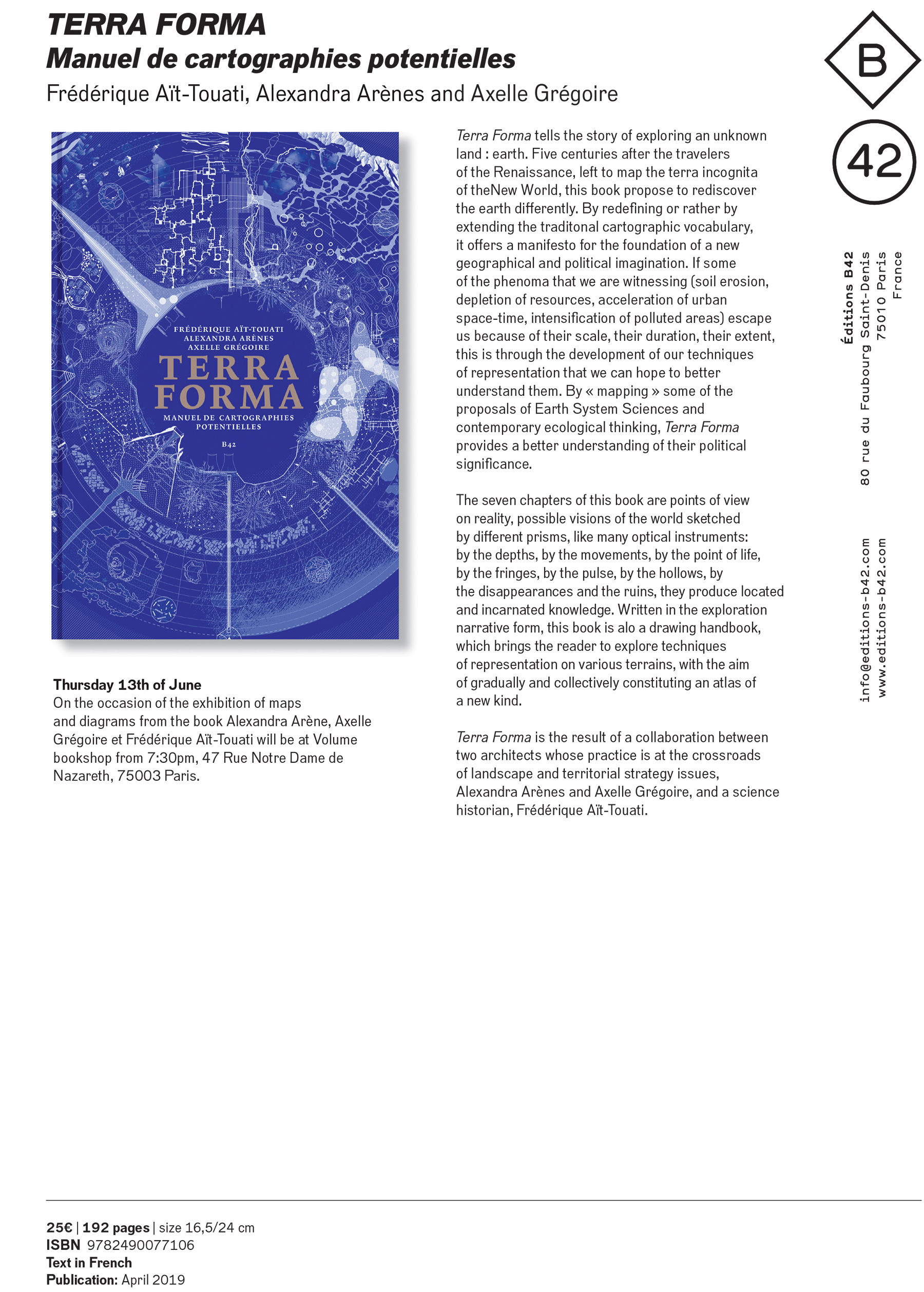
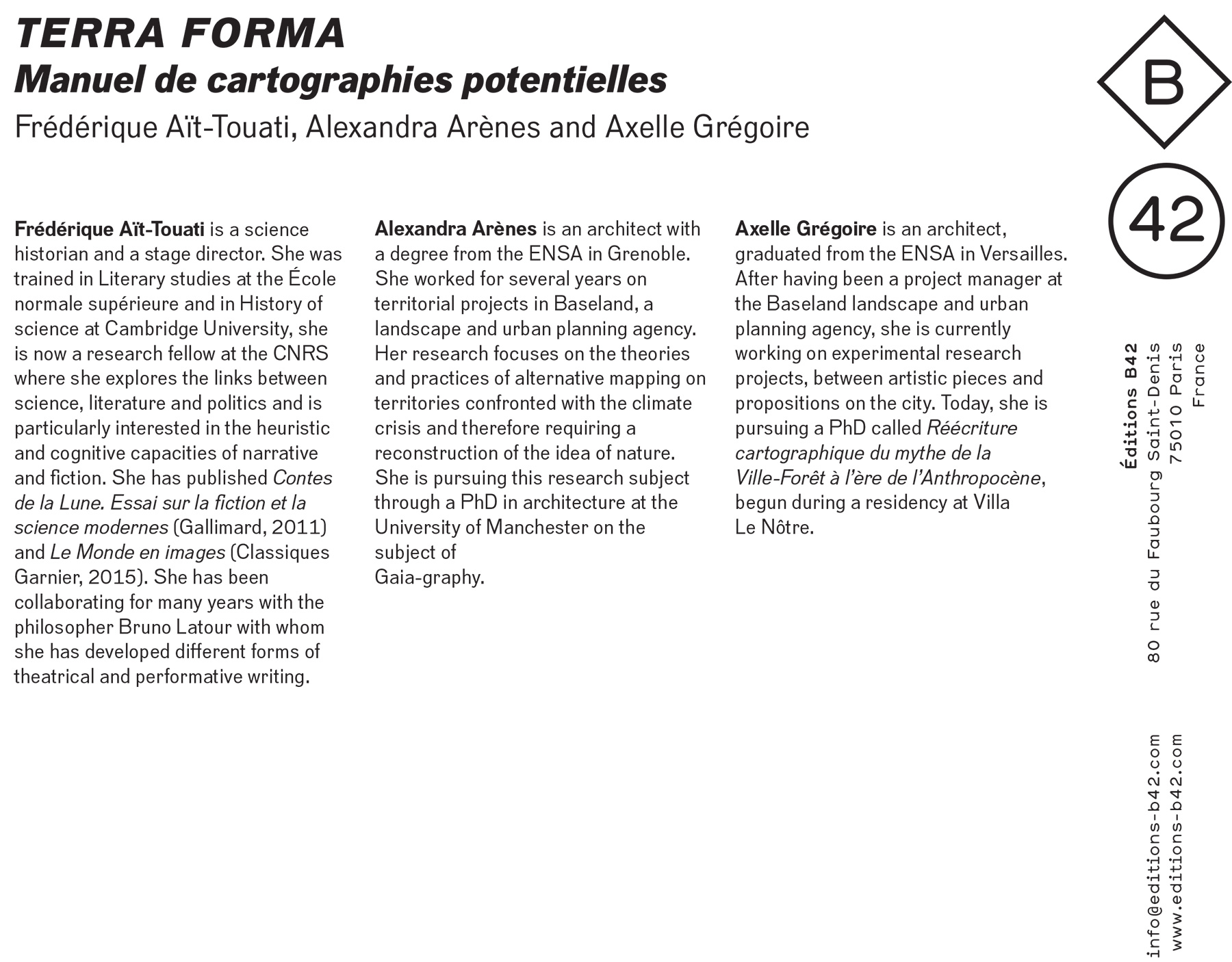
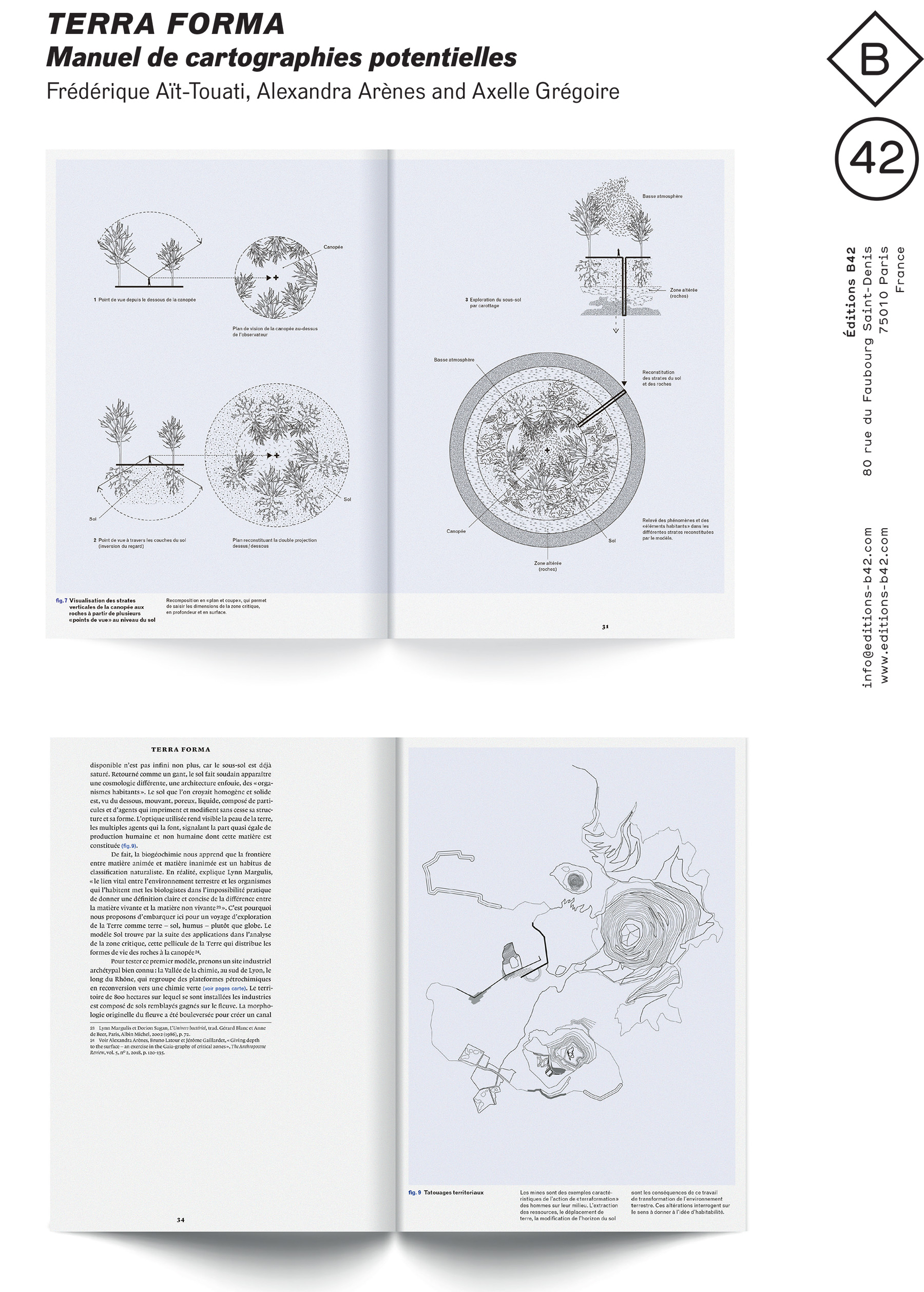
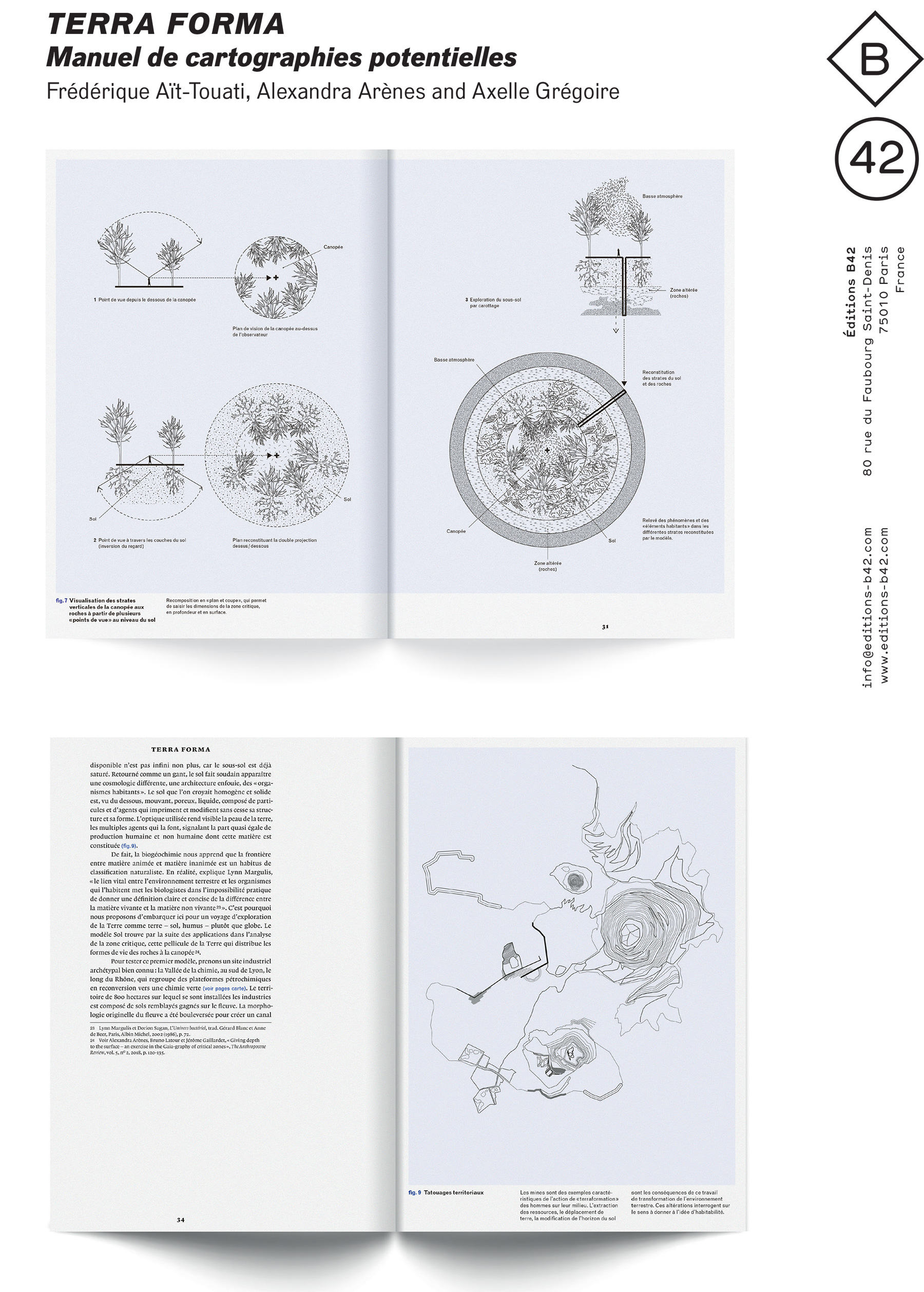
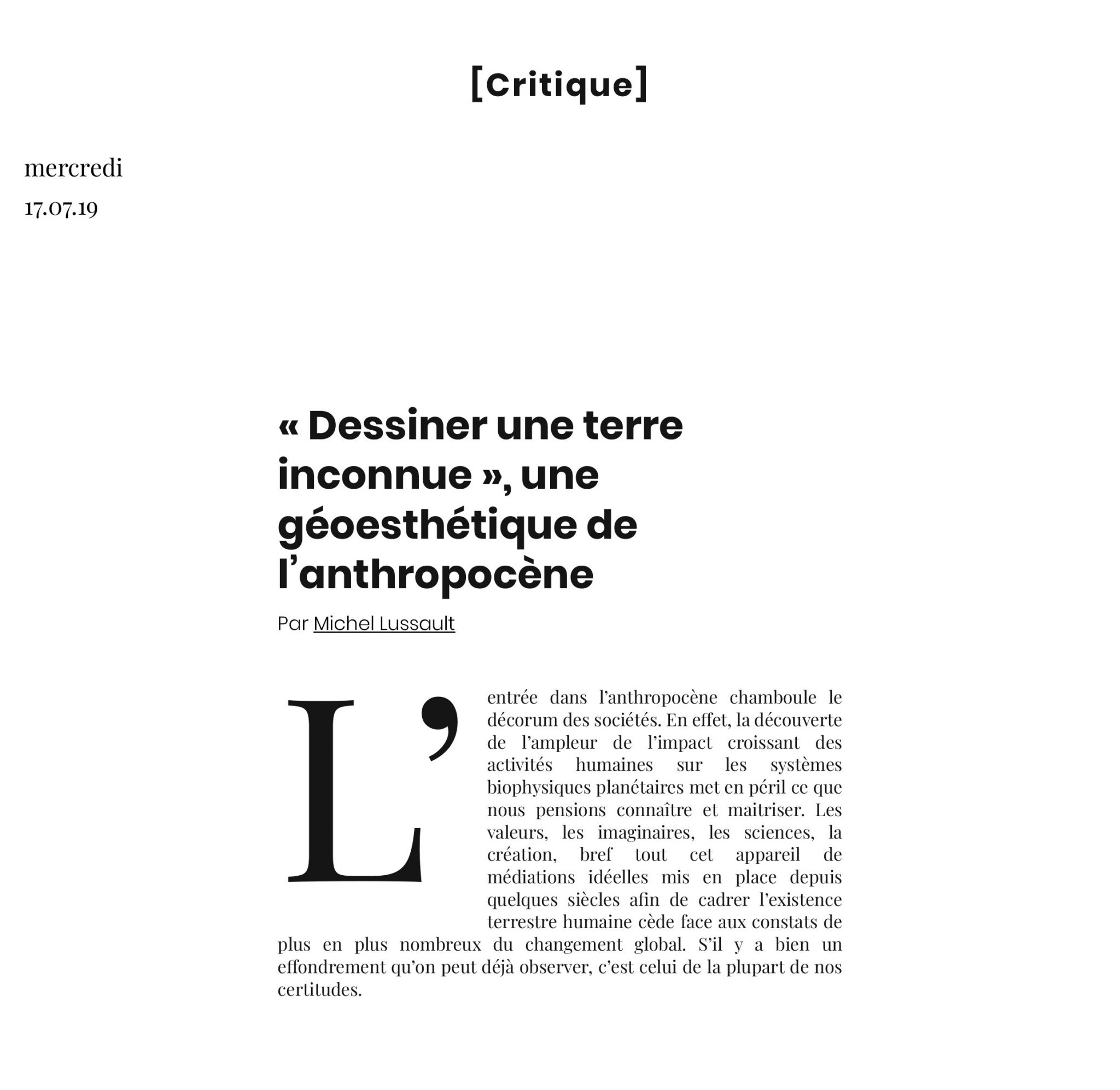
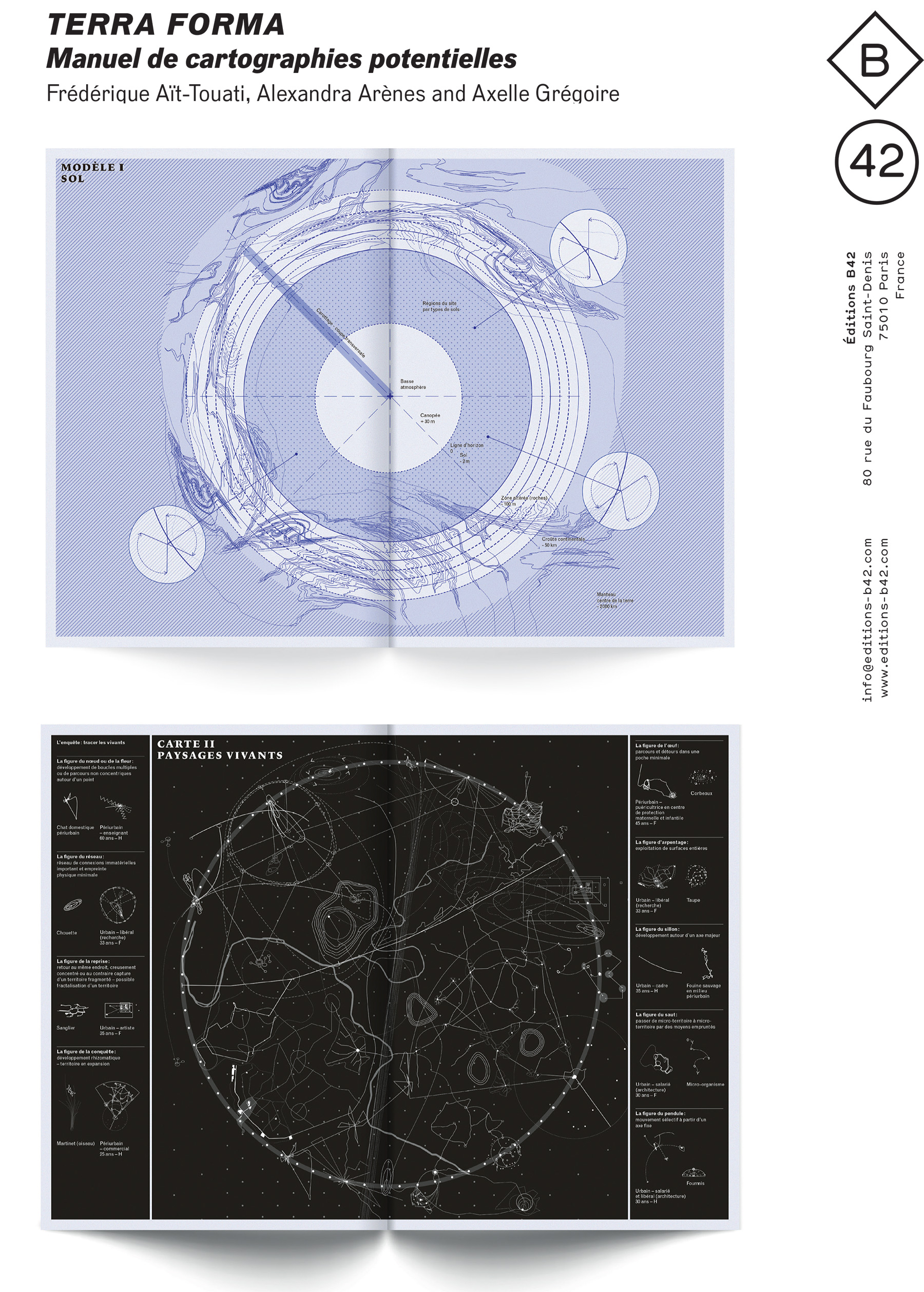
Univers Préparé – sur Aquaalta de Céleste Boursier-Mougenot
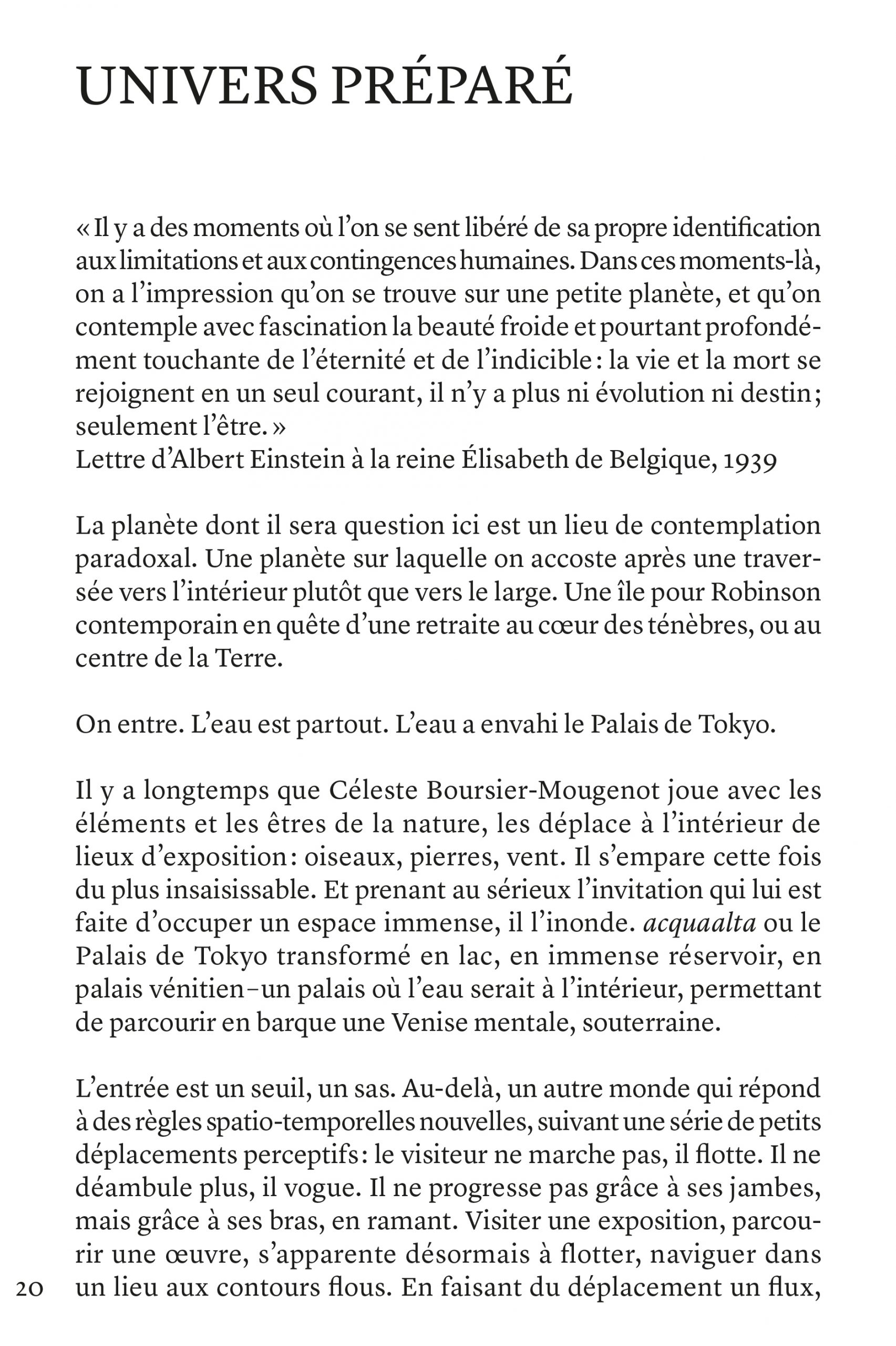
INSIDE ET MOVING EARTHS (unplugged)
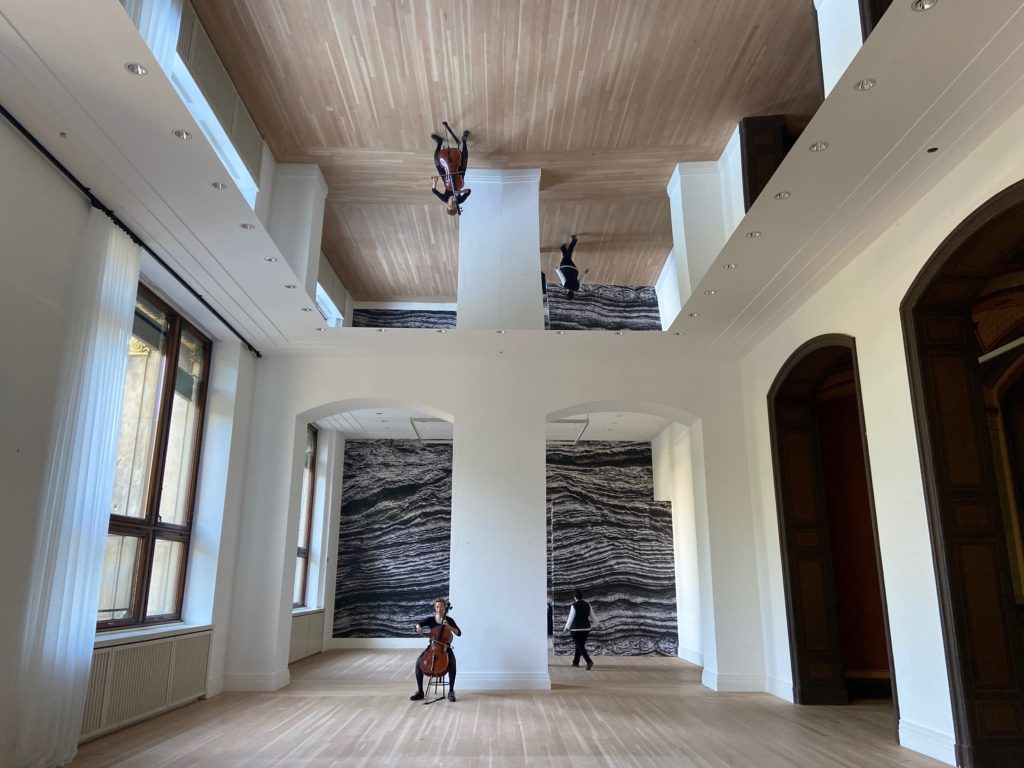
An installation-performance by Frédérique Aït-Touati and Bruno Latour
with the complicity of Patrick Laffont de Lojo
Directed by: Frédérique Aït-Touati
Stage design: Patrick Laffont de Lojo
With : Duncan Evennou
Translation : Andrew Todd
Production: Critical Zone
Co-production: Centre Pompidou, Théâtre Nanterre-Amandiers, Berliner Festspiele
With the participation of DICRéAM and the support of the Carasso Foundation
Premiere: September 2020, Martin Gropius Bau (Berliner Festspiele), Berlin
Public work in progress: Uppsala (Sweden); Théâtre Nanterre-Amandiers;
Théâtre de l’Odéon – Paris
Contacts :
Artistic direction : Frédérique Aït-Touati / f.aittouati@gmail.com
Production and distribution manager: Elise Blaché /production@frederiqueaittouati.com
Administration: Emilie Lucas / admi.praxi@gmail.com
Website of the Cie : zonecritiquecie.org
Acknowledgements : Thomas Oberender, Tino Sehgal, Albrecht Gruess
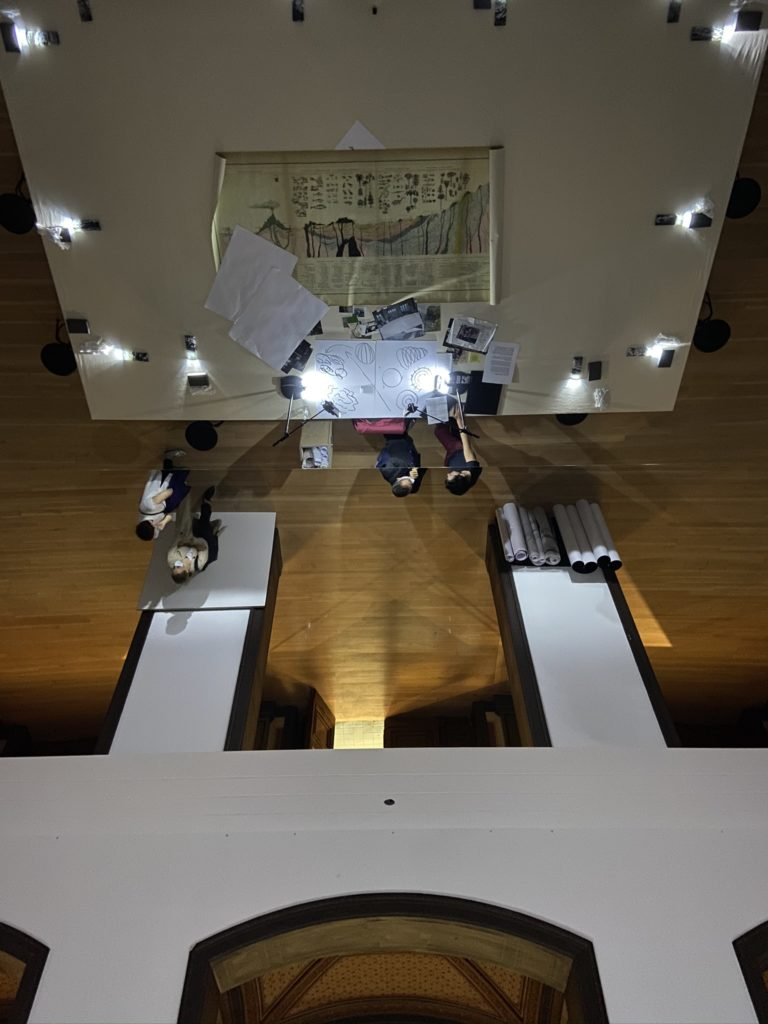
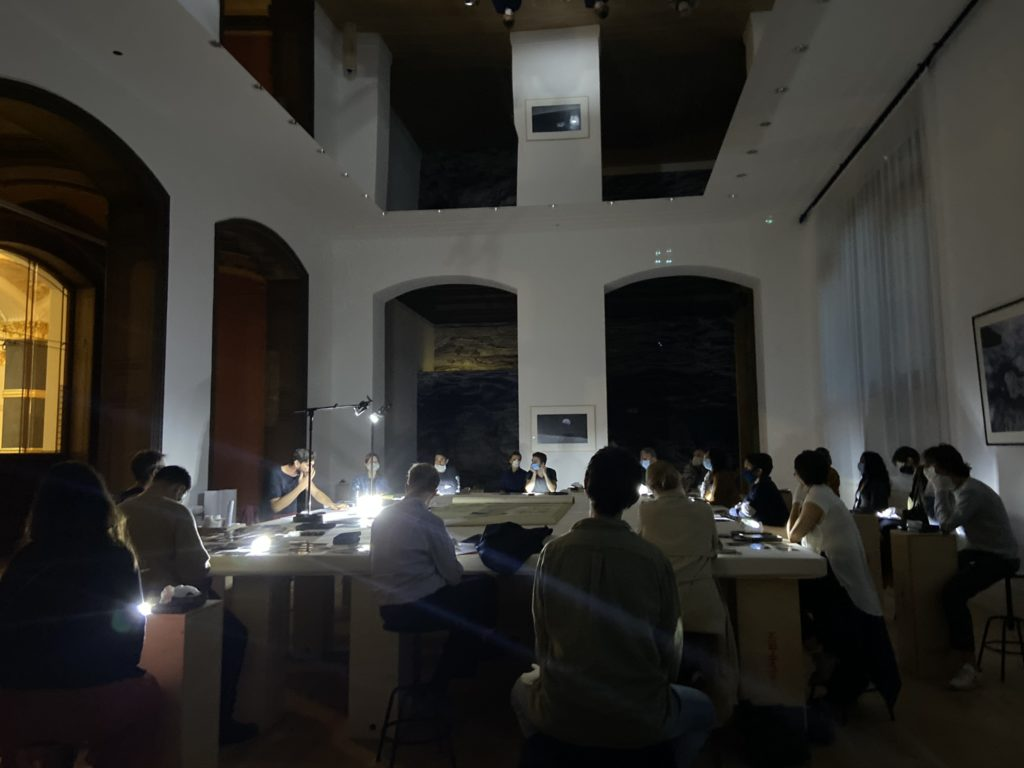

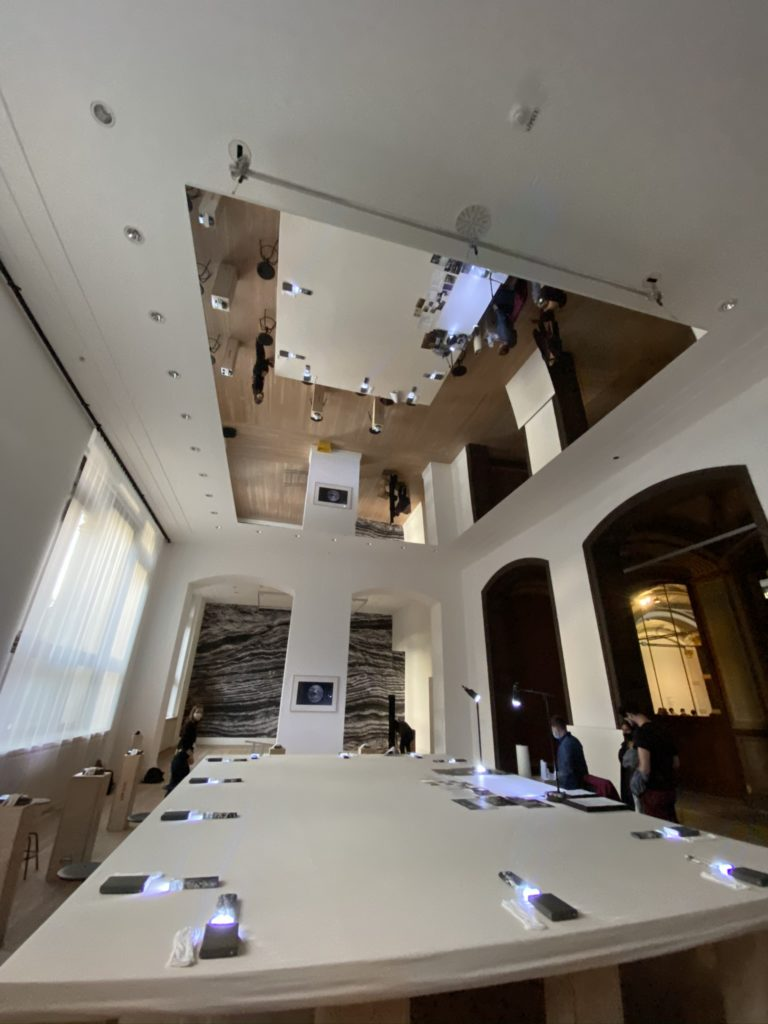
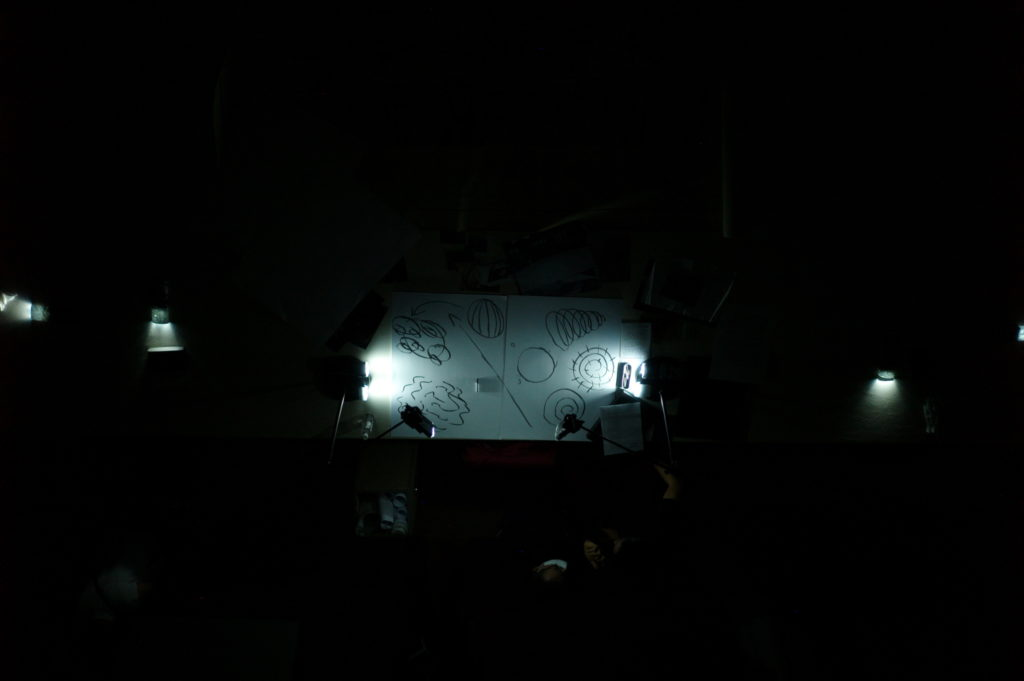
Climats du théâtre au temps des catastrophes
Penser et décentrer l’anthropo-scène
Frédérique Aït-Touati et Bérénice Hamidi-Kim

Depuis quelques années, la catastrophe écologique en cours occupe une partie croissante du champ politique, médiatique, intellectuel et artistique, à mesure que l’urgence est devenue incontournable. Depuis la COP 21 en particulier, et de manière frappante depuis quelques mois avec l’essor de deux mouvements internationaux de générations différentes, la mobilisation de lycéens pour le climat et le mouvement « Extinction Rebellion », cette question préoccupe bien au-delà du cercle des spécialistes et des militants. En France comme ailleurs, les mondes de l’art se font l’écho de ces préoccupations, et on ne compte plus aujourd’hui le nombre d’œuvres artistiques, scéniques notamment, qui traitent des bouleversements climatiques et plus largement des rapports entre les humains et le monde qu’ils habitent. Dans ce foisonnement d’œuvres qui accompagnent, précèdent ou réagissent à ce vaste mouvement[1], le théâtre occupe une place singulière qu’il nous faut interroger.
Par rapport aux récits d’alerte présents dans d’autres champs (en science, en philosophie, au cinéma), le théâtre problématise d’emblée l’inefficacité de l’alerte. Il la reformule et en teste l’impuissance. Il rejoue le mécanisme de l’adresse sans résultat. Il creuse l’abîme entre les paroles et les actes. Il met en scène le désespoir d’une parole non suivie d’action. De fait, les œuvres qui abordent ces thématiques ne sont pas le fait d’« artivistes » de la cause écologique et la réception dont elles bénéficient ne les relègue pas au rang de spectacles didactiques et militants. Parmi les spectacles marquants et remarqués de la saison 2018-2019, on peut citer ainsi Arctique de Anne-Cécile Vandalem (création 2018), Les Tourmentes de Sylvain Creuzevault et La Vase de Pierre Meunier (création 2017). Le premier, qui se veut une « comédie futuriste », situe l’action dans un avenir tout proche, un presque présent pour nous confronter aux conséquences désastreuses du réchauffement climatique pour l’organisation des sociétés humaines. Le second, inspiré entre autres de Construire un feu de Jack London, confronte des humains à des espaces naturels hostiles dans une série de spectacles pensés comme des « natures vives », par opposition aux natures mortes. Le troisième spectacle est le fait d’un artiste qui mène depuis des années un travail de longue haleine sur le monde minéral et végétal (notamment depuis Le Tas en 2002) et qui s’empare cette fois de la vase, matière molle et déconsidérée, pour en explorer toutes les potentialités sensorielles et relationnelles.
Si le chaos climatique pose de formidables obstacles à la représentation, il offre simultanément l’occasion d’interroger d’autres manières d’habiter l’espace du théâtre. Les pièces, spectacles, auteur·rice·s et metteur·se·s en scène dont il est question dans ce chantier s’intéressent moins au changement climatique proprement dit qu’à une conception du monde qui ne place plus l’être humain et ses intérêts au centre de la scène. Ce faisant, ce sont les fondements mêmes du théâtre tel qu’il a été longtemps défini comme essentiellement « art de l’humain » qui sont bouleversés. Le paradoxe vaut d’être souligné : l’entrée dans le « temps de l’humain » – traduction littérale de l’anthropocène, ce néologisme proposé par Paul Crutzen en 2000 dont on sait la fortune dans toutes les disciplines, de l’art aux sciences humaines et sociales – coïncide avec un vaste mouvement de décentrement de l’humain sur les scènes de théâtre. De fait, certaines des questions anthropologiques, politiques et écologiques contemporaines les plus vives sont des questions de dramaturgie et de scénographie : qui parle ? qui distribue les rôles ? qui a le pouvoir d’agir et comment ? qui décide de l’occupation des territoires, de la façon d’y circuler ? Et une autre question encore, qui sera celle qui nous occupera au premier chef dans ce numéro : quelle est la scène de l’anthropos et que signifie partager cette scène, habiter parmi les vivants ? Ce numéro explore à la fois la façon dont les questions écologiques (réchauffement climatique, effondrement de la biodiversité, rapport entre humains et non-humains, épuisement des ressources) investissent la scène théâtrale et la manière dont le théâtre est devenu un lieu où se joue une interrogation particulière sur les phénomènes naturels – leur perception, leur visualisation, leur représentation. À cet égard, il est significatif que l’un des actes de naissance de l’anthropocène se soit joué dans un théâtre, sur une scène : la rencontre inaugurale du Groupe de Travail de l’Anthropocène de la Commission de stratigraphie s’est déroulée le 17 octobre 2014 sur la scène de la Haus der Kultur der Welt – la Maison des cultures du monde – à Berlin. Une coïncidence frappante qui n’a pas échappé à la jeune troupe Lighthouse Company qui en a fait le sujet de sa performance Matters. Si la question théâtrale centrale du XVIe siècle, comme le rappelle Marc Bayard, était de comprendre comment l’humain trouve sa place, quelle est la valeur de la figuration humaine sur scène, la question posée aujourd’hui par l’urgence écologique est tout autant celle de la place du non-humain. Comment représenter ce nouveau collectif, hétérogène, humain et non-humain, nouvellement constitué par les questions écologiques ?
Pour penser ces œuvres, mais aussi, plus largement, les déplacements épistémologiques, sensibles et politiques auxquels elles nous invitent, les études théâtrales se mobilisent fortement, en s’appuyant notamment sur le corpus théorique élaboré depuis une dizaine d’années dans le champ des sciences humaines et sociales, qui a permis un renouveau dans la manière de penser les rapports humains-non-humains, qu’il s’agisse d’apprendre des animaux considérés comme des espèces sauvages ou comme des espèces compagnes, telles que les abordent Donna Haraway, Isabelle Stengers, Vinciane Desprets et Baptiste Morizot, ou des êtres vivants non animés que sont les plantes, au cœur des travaux de Emmanuele Coccia. En France, pour la seule année universitaire 2018-2019, on compte ainsi pas moins de deux séminaires portant sur les « Arts et humanités environnementales »[2] et sur « Théâtre et écologie : la nature n’est plus un décor »[3], ainsi qu’un colloque, « Le théâtre face à l’avenir climatique. Archives du vivant, dystopies ou propositions ? »[4].
Le présent chantier se voudrait donc une contribution parmi d’autres à ces réflexions, sans prétention à l’exhaustivité, ni sur le plan des théorisations esthétiques et politiques de la question écologique, ni sur le plan des propositions scéniques. Parmi les lignes de force qui le traversent, la première est le souci, tout en assumant une proximité avec les travaux de Bruno Latour, de donner à lire une diversité d’approches, marquées par un pluralisme culturel et générationnel. Centrée sur la notion d’anthropocène (accompagnée de tous les débats autour de cette notion), la première partie du chantier donne la parole à certains des chercheurs anglophones qui ont été pionniers dans la réflexion sur les liens singuliers entre théâtre et écologie : c’est l’enjeu de l’article de Carl Lavery, qui livre une réflexion sur les différents types d’images écologiques à l’œuvre dans les arts visuels et au théâtre (« Comment penser l’image écologique dans le théâtre contemporain : l’image élémentaire dans Some Things Happen All At Once de Mike Brookes et Rosa Casado »). C’est aussi l’enjeu des trois textes de la pionnière des études éco-poétiques au théâtre, Una Chaudhuri, dont on publie pour la première fois en français plusieurs articles fondateurs, l’un datant des années 1990 (« ‘‘Il doit y avoir beaucoup de poissons dans ce lac’’ : vers un théâtre écologique ») et l’autre très récent (« Anthropo-scènes : la mise en scène du climat et du chaos dans le théâtre des idées mauvaises »), ainsi qu’un « livret de jeu » en forme de manifeste (« CLIMATE LENS »), témoignant de l’implication politique des artistes et des chercheurs qui se saisissent de ces questions.
Ce numéro est aussi l’occasion de donner la parole aux jeunes chercheurs, qui investissent avec force ces questions, comme Emma Merabet, autrice de la première thèse sur ce sujet dans les études théâtrales françaises (« Déplacements : trois itinéraires éco-poétiques autour de l’animal, du végétal et du minéral (Michaël Cros, Émilie Flacher et Benoît Sicat) »). Ce souci de pluralisme se manifeste aussi dans le choix des œuvres étudiées. Cohabitent donc des figures aussi dissemblables les unes des autres qu’elles sont incontournables du fait de leur engagement artistique au long cours. C’est le cas de Frédéric Ferrer et de ses Cartographies (« Entre vulgarisation scientifique et poétisation ludique du chaos ») ; c’est également le cas de Philippe Quesne et du projet qu’il porte à la fois dans sa compagnie, Vivarium Studio, et par la programmation qu’il déploie depuis des années au Théâtre Nanterre-Amandiers (« ‘‘C’est la cohabitation humain/non-humain qui m’intéresse’’ ») ; c’est le cas enfin de la compagnie du Singe Debout, présente par le biais d’un entretien avec Jade Duviquet (« L’humanimalité en jeu »), et d’un article d’Anne Simon qui contribue à interroger les rapports entre la zoopoétique et la scène (« Le champ, l’arche et la chaîne : zoopoétique et zoomorphisme »).
Seconde ligne de force, ce chantier se veut fidèle à la ligne éditoriale de la revue en sollicitant des chercheurs venus des sciences humaines et sociales. La philosophe Aline Wiame souligne ainsi le rôle spécifique que peut jouer l’art ou plus précisément l’activité de fictionnalisation et de fabulation (« Fabuler, devenir-terrien »). Cette ressource politique permet non de fuir le réel, mais d’inventer de nouveaux mondes possibles, et de concevoir le sujet politique collectif habitant ces mondes en l’extirpant des définitions majoritaires et identitaires. À travers une promenade dans les œuvres de Quesne ou Delcuvellerie en compagnie de Deleuze et Haraway, elle montre que le peuple ainsi considéré est caractérisé par son mode d’existence imaginaire et processuel, « en fabulation continue ». Dans une perspective philosophique comparable, Flore Garcin-Marrou développe les conséquences dramaturgiques et scénographiques les plus radicales d’une prise en compte du monde végétal comme élément non plus accessoire, mais central de l’espace habité (« Théâtrologie des plantes ou le plant turn du théâtre contemporain »).
Le souci des formes scéniques, mais aussi des formes de vie – vie professionnelle, mais aussi vie quotidienne – dont elles témoignent est un troisième type de préoccupation récurrent de la revue thaêtre. C’est la question au cœur du questionnaire « Quel terrien es-tu ? », adressé à Michaël Cros, Émilie Flacher, Benoît Sicat, dont les œuvres sont par ailleurs analysées dans l’article d’Emma Merabet, ainsi qu’à Duncan Evennou et Clémence Hallé (auteurs de Matters), dont l’intérêt pour la question écologique est né, entre autres, de leur participation au projet du Théâtre des négociationsmené au Théâtre Nanterre-Amandiers en 2015. Le carnet de création sur ce projet explore une collaboration entre artistes, chercheurs et étudiants qui fait de l’espace théâtral le lieu d’une expérimentation politique singulière (« Le Théâtre des négociations, un laboratoire à ciel ouvert ») : simulation de la COP21 six mois avant l’Accord de Paris par 200 étudiants venus du monde entier, ce projet tente de repenser le théâtre politique des négociations climatiques en faisant place dans notre espace mental et vécu à ce qui en a été exclu (êtres de la nature, territoires en danger, lobbys industriels, sols, peuples autochtones).
En miroir, la dernière partie du chantier se concentre sur différents projets et œuvres qui se sont emparés ces dernières années de la catastrophe écologique de Fukushima ; ils attestent un rapport d’autant plus inquiet et déstabilisé au futur et à la temporalité que les œuvres dont il est question ne tentent pas d’agir directement sur les événements qui ont (eu) lieu. La catastrophe nucléaire de Fukushima est venue faire irruption dans le présent, mais elle a aussi interrompu une certaine manière de concevoir la temporalité. Elle a défait le temps. Ce questionnement est au cœur du projet de recherche-création « Quelles vies quotidiennes après Fukushima ? », mené en 2015 entre Lyon et Tokyo en compagnie d’un artiste japonais, Toshiki Okada, et d’un artiste français, Bruno Meyssat. Ce projet interroge tout à la fois la capacité du théâtre à représenter une catastrophe qui excède les capacités de perception humaine et nous confronte, dans l’espace et dans le temps, à l’infiniment grand et à l’infiniment petit, au spectaculaire horrible (la défiguration des corps) ou grandiose (le retour à l’état sauvage de paysages anciennement urbains) comme à l’invisible (l’atome). Parce qu’elle excède les frontières habituelles de l’espace et du temps, la catastrophe nucléaire confronte plus que d’autres les artistes à une série d’interrogations qui peuvent être subsumées par ce qui est peut-être la plus brûlante des questions politiques aujourd’hui : au nom de quoi suis-je habilité à prendre la parole ? Ou, pour le dire autrement, en quoi suis-je concerné ? En tant que victime, en tant que témoin, en tant qu’habitant de la planète Terre ? Les entretiens avec Toshiki Okada et avec l’ancienne programmatrice du festival de Tokyo, Chiaki Soma, montrent combien le fait d’appartenir au pays victime de la catastrophe ne suffit pas à résoudre la question de la légitimité à s’emparer de l’événement, mais la situe et la précise (« ‘‘C’est difficile de tuer un fantôme…’’ ou le théâtre à l’ombre de la catastrophe » et « Le théâtre face à la catastrophe et face au pouvoir. Les répliques artistiques et politiques du 3/11 au Japon »). En regard, l’entretien avec Bruno Meyssat autour de la création de 20 mSv souligne le rôle complexe de l’exigence documentaire, tout à la fois ressource pour se sentir autorisé à prendre la parole, durant le processus de création, et source d’une tension dramaturgique féconde dans la relation au spectateur, entre souci d’informer le citoyen et attention à préserver la liberté de cadrer du sujet psychique (« 20 mSv ou comment appréhender l’insaisissable »). La catastrophe nucléaire pose question aux metteur·se·s en scène. Mais la question du cadrage, de ce qui se joue dans le fait de décrire, et d’écrire la catastrophe, est évidemment aussi une question pour les auteur·rice·s, comme l’ont bien saisi Enzo Cormann et Samuel Gallet, quand ils ont proposé aux jeunes auteur·rice·s en formation de l’ENSATT de s’approprier cet événement « comme territoire d’écriture, d’invention et d’émancipation » (« Écrire Fukushima »).
Notes
[1] Les travaux traitant de cet « art de l’anthropocène » ou plus largement d’un bouleversement du rapport au vivant ou à la Terre se multiplient ces dernières années. Voir par exemple pour une bonne synthèse dans les arts visuels la thèse et la bibliographie de Matthieu Duperrex, Arcadies altérées. Territoires de l’enquête et vocation de l’art en anthropocène, thèse dirigée par Frédéric Guerrin et Daniel Estevez, soutenue le 7 décembre 2018 à l’Université Toulouse Jean Jaurès.
[2] Séminaire « Arts et humanités environnementales », organisé par Julie Sermon à l’Université Lumière Lyon 2, laboratoire Passages XX-XXI, novembre 2018-juin 2019.
[3] Séminaire « Théâtre et écologie : la nature n’est plus un décor », organisé par Frédérique Aït-Touati, Anne-Françoise Benhamou et Isabelle Moindrot, École Normale Supérieure de la rue d’Ulm, octobre 2018-mai 2019.
[4] Colloque international « Le théâtre face à l’avenir climatique. Archives du vivant, dystopies ou propositions ? », organisé par Éliane Beaufils, Théâtre Nanterre-Amandiers, 14 décembre 2018.
Pour citer ce document
Frédérique Aït-Touati et Bérénice Hamidi-Kim, « Avant-propos », thaêtre [en ligne], Chantier #4 : Climats du théâtre au temps des catastrophes. Penser et décentrer l’anthropo-scène, mis en ligne le 10 juillet 2019.
URL : https://www.thaetre.com/2019/07/06/4-climats-du-theatre-au-temps-des-catastrophes/